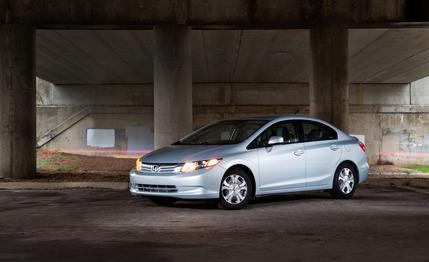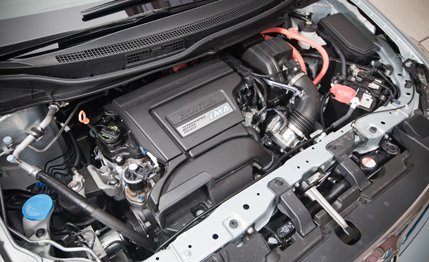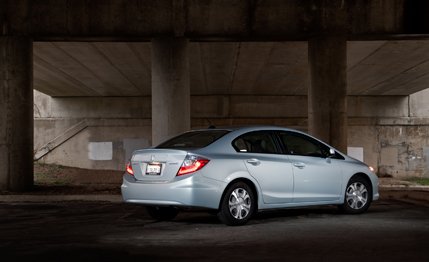 Instrumented Test
Instrumented Test

While the standard, ninth-generation Honda Civic goes down the road with almost no fervor, the iconic small car has become more comfortable, more advanced, and easier to live with as it matures. As it did with its conventionally powered model, Honda has made a significant number of improvements to the Civic hybrid for 2012. Also as with the nonhybrid Civics, Honda has taken a careful approach, and the changes amount to something short of revolution.
Most significant for 2012, the third-gen hybrid’s internal-combustion engine now displaces 1.5 liters and produces 90 horsepower and 97 pound-feet of torque, three fewer ponies but eight more pound-feet than the previous car’s 1.3-liter four. Sandwiched between the engine and a continuously variable automatic transmission is a stronger electric motor that adds 23 horsepower and 78 pound-feet to the mix; the lighter and more powerful battery pack behind the rear seatback now uses lithium-ion chemistry instead of nickel-metal hydride. Combined horsepower stays at 110, but torque climbs four pound-feet to 127.
Honda claims the electric motor can now propel the vehicle on its own up to 43 mph, yet in more than 600 miles of mixed driving, we never felt the car move without the gas engine running. Hitting the “ECON” button on the dash makes up for this somewhat by relaxing the throttle, recalibrating the electrical systems for maximum efficiency, and coercing you to putt around like you’re half dead.

With a fully charged battery and 27 fewer pounds to lug around than the previous Civic hybrid we tested, the new car reaches 60 mph in 10.1 seconds and runs the quarter-mile in 17.7—still leisurely but better by 0.7 and 0.6 second, respectively.
Fuel-economy ratings also jump from 40 mpg in the city and 43 on the highway to 44/44. More-aggressive-than-normal driving cycles—even for us—netted a 37-mpg average, down from the observed 40 mpg we saw from the previous model. But drive it casually, and real-world returns should be in the low 40s. The best of the conventionally powered cars in the Civic’s C-segment can achieve real-world results not too far from the Civic hybrid’s mark. We netted 39 mpg in 1000 miles of mixed driving and no hypermiling nonsense in a Chevrolet Cruze Eco [November 2011].
As expected, the Civic hybrid is not a very dynamic vehicle, with 15-inch wheels wearing low-rolling-resistance tires that limit grip to just 0.77 g and allow a startling 196 feet to pass before stopping from 70 mph. The CVT features a sportier “S” mode that holds the revs higher for better throttle response, but it also exaggerates the coarse droning of the engine under load. In addition, the grabby regenerative brakes are difficult to modulate, the numb-yet-quick electric steering makes for frequent corrections at highway speeds, and the integration of gas and electric power is less than smooth at times.

Like all Civic sedans, the new hybrid boasts a more spacious interior, with three more inches of elbowroom up front and nearly two inches of additional legroom in back. Combined with its large greenhouse, the cabin feels airy, and the various hard plastics look better than before.
Niggles include front seats with too much permanent lumbar support and an array of minuscule center-stack buttons seemingly designed to be operated by tiny elfin fingers.
The conservative redesign of the already-futuristic-looking Civic carries over to the hybrid, with subtle changes including a different grille, aluminum wheels, headlights with blue accents, and LED taillights.
Starting at $24,820, the premium for the hybrid is about $3500 more than a comparably equipped Civic EX sedan. Our maxed-out tester rang in at $27,520 with leather seating and navigation. That’s Toyota Prius money and thousands more than Honda’s own Insight hybrid. And while the newest Civic hybrid has slightly narrowed the fuel-economy gap with the Toyota, the Prius’s 50-mpg combined EPA number is still some distance off. And with the continued refinements to conventional gas-fed powertrains over the past few years, the Civic hybrid finds itself in a precarious position, achieving neither the relative simplicity and cost-effectiveness of the conventional C-segment fuel sipper nor the stratospheric EPA numbers of that pesky Toyota.